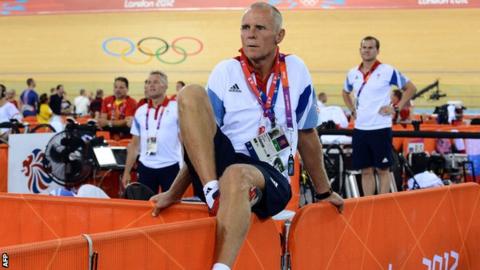
Shane Sutton should have got a “slap on the wrist” if necessary but should have stayed on at British Cycling, ex-swimming boss Bill Sweetenham says.
Sutton resigned as technical director on Wednesday amid claims of sexism and discrimination towards elite cyclists.
The Australian has denied the allegations and said he stepped down in the best interests of British Cycling.
“There will be times you push the boundaries a bit too hard,” Sweetenham told BBC Sportsweek.
“Perhaps this is one of those moments for Shane, I’m just speaking from a coaching point of view.
“If he’s done something that is inappropriate but is not going to ruin GB’s chances, slap him on the wrist if necessary but keep him in to get the job done.”
Sweetenham, who resigned as British Swimming performance director in 2007 having been cleared of allegations of bullying, was confident Sutton used methods intended to “get the result that’s best for the athlete”.
“Shane may be feeling pressure going into his first Olympics as the head man,” said Sweetenham, who oversaw British Swimming win 18 World Championship titles.
“That brings a test for him personally.”
Sutton, 58, was made British Cycling technical director in 2014 when predecessor Sir Dave Brailsford stepped down after a decade in charge, but is alleged to have used derogatory words like “wobblies” and “gimps” to describe Para-cyclists.
GB cyclist Jess Varnish also said 58-year-old Sutton made sexist comments towards her and told her to “go and have a baby”.
Sutton has said he “rejects the specific claims”.
Sutton, who was part of the team that won seven track gold medals at both the 2008 and 2012 Olympics, left his post 100 days before the start of the Rio Games.
Sweetenham said all successful coaches need someone working “in the background” to provide them with guidance.
“When you have an outstanding coach, like Shane, they need to have a mentor or guidance person with them to manage some of their comments,” he said.
“If he [Sutton] is guilty of what he’s been accused of he’ll have to moderate his behaviours, because the world is changing and each generation is going to bring to the senior and older coach more challenges.
“They can’t change the culture – the coach will have to change.”



